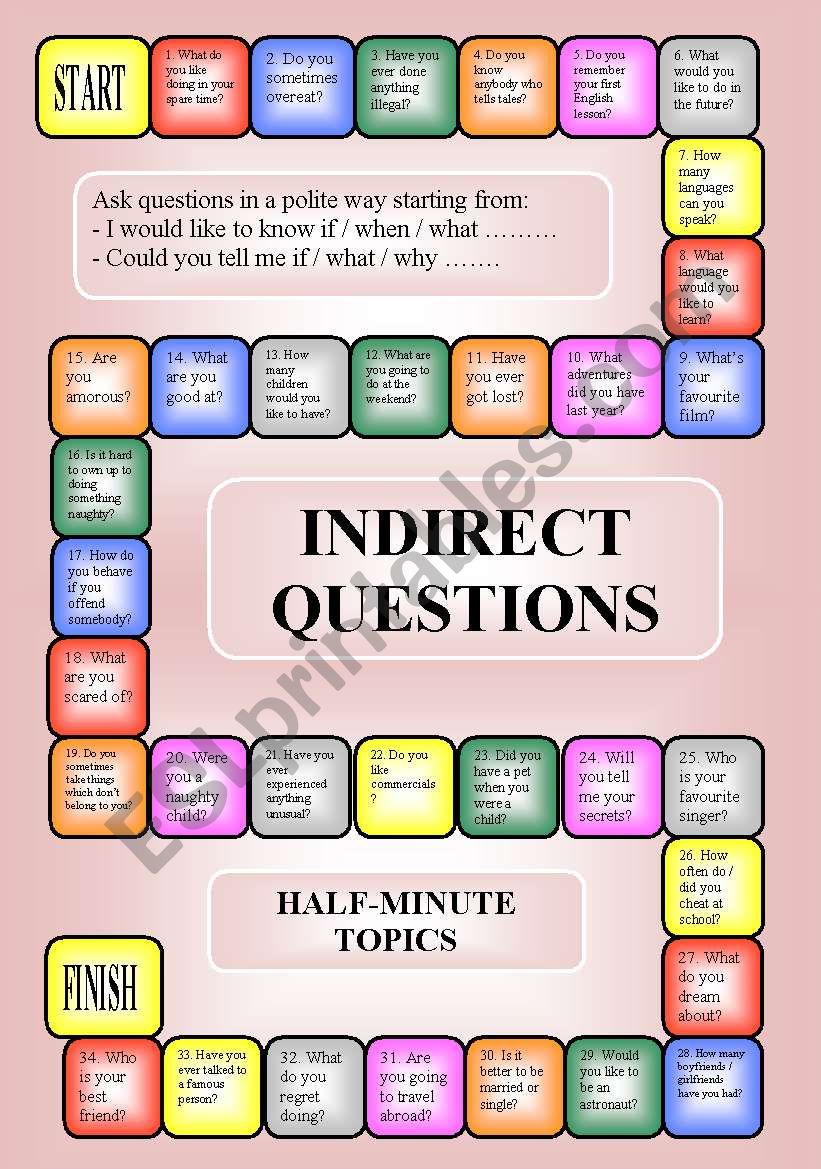- Obtener enlace
- X
- Correo electrónico
- Otras aplicaciones
What is an indirect question examples?
Indirect questions are a little more formal and polite. We use them when talking to a person we don't know very well, or in professional situations, and their form is a little different. Example of an indirect question: “Could you tell me where the bathroom is?”, we use indirect questions when we want to be more polite, more formal or less confrontational.
PRACTICE WITH THIS GAME

UNIT TWO GENERATIONS
Common verbs followed by a gerund:
Example: He misses playing with his friends.
- abhor
- acknowledge
- admit
- advise
- allow
- anticipate
- appreciate
- avoid
- be worth
- can’t help
- celebrate
- confess
- consider
- defend
- delay
- detest
- discontinue
- discuss
- dislike
- dispute
- dread
- endure
- enjoy
- escape
- evade
- explain
- fancy
- fear
- feel like
- feign
- finish
- forgive
- give up (stop)
- keep (continue)
- keep on
- mention
- mind (object to)
- miss
- necessitate
- omit
- permit
- picture
- postpone
- practice
- prevent
- put off
- recall
- recollect
- recommend
- report
- resent
- resist
- resume
- risk
- shirk
- shun
- suggest
- support
- tolerate
- understand
- urge
- warrant
Common verbs followed by an infinitive:
Example: She threatened to quit if she didn't get a raise.
- agree
- appear
- arrange
- ask
- attempt
- beg
- can/can’t afford
- can/can’t wait
- care
- chance
- choose
- claim
- come
- consent
- dare
- decide
- demand
- deserve
- determine
- elect
- endeavor
- expect
- fail
- get
- grow (up)
- guarantee
- hesitate
- hope
- hurry
- incline
- learn
- manage
- mean
- need
- neglect
- offer
- pay
- plan
- prepare
- pretend
- profess
- promise
- prove
- refuse
- remain
- request
- resolve
- say
- seek
- seem
- shudder
- strive
- struggle
- swear
- tend
- threaten
- turn out
- venture
- volunteer
- wait
- want
- wish
- would like
- yearn
Verbs followed by a gerund or infinitive with little or no change in meaning:
Example: It started to rain. / It started raining.
- begin
- can’t bear
- can’t stand
- continue
- hate
- like
- love
- prefer
- propose
- start
Verbs followed by a gerund or infinitive with a change in meaning:
| forget | I forgot to meet him.(I didn’t meet him because I forgot to do it.) |
I forgot meeting him.(I don’t have the memory of meeting him before.) | |
| go on | He went on to learn English and French.(He ended one period of time before this.) |
He went on learning English and French.(He continued learning the languages.) | |
| quit | She quit to work here.(She quit another job in order to work here.) |
She quit working here.(She quit her job here. She doesn’t work here anymore.) | |
| regret | I regret promising to help you.(I’m sorry that I made the promise.) |
I regret to tell you that we can't hire you.(I’m telling you now, and I’m sorry.) | |
| remember | She remembered to visit her grandmother.(She didn’t forget to visit.) |
She remembered visiting her grandmother.(She had memories of this time.) | |
| stop | I stopped to call you.(I interrupted another action in order to call you.) |
I stopped calling you.(I stopped this activity. Maybe we had a fight.) | |
| try | I tried to open the window.(I attempted this action but didn’t succeed.) |
I tried opening the window.(This was one option I sampled. Maybe the room was hot.) |
- Obtener enlace
- X
- Correo electrónico
- Otras aplicaciones



Comentarios
Publicar un comentario